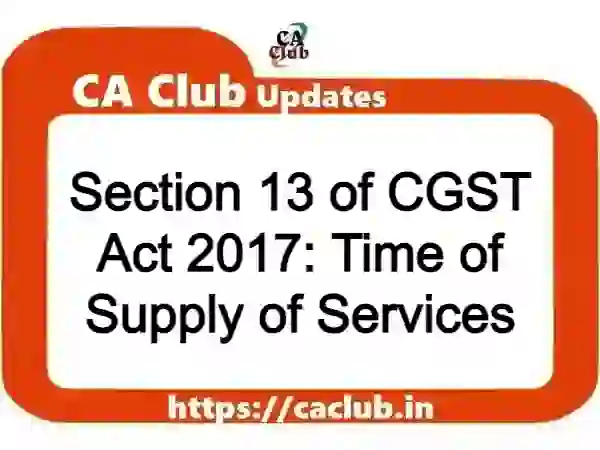Provisions under Section 13 of the Central Goods and Services Tax (CGST) Act, 2017 relating to “Time of Supply of Services”, are as under:
Section 13 of CGST Act 2017: Time of Supply of Services (CHAPTER IV – TIME AND VALUE OF SUPPLY)
(1) The liability to pay tax on services shall arise at the time of supply, as determined in accordance with the provisions of this section.
(2) The time of supply of services shall be the earliest of the following dates, namely:—
(a) the date of issue of invoice by the supplier, if the invoice is issued within the period prescribed under sub-section (2) of [text omitted from 01/02/2019: refer Note 1] section 31 or the date of receipt of payment, whichever is earlier; or
(b) the date of provision of service, if the invoice is not issued within the period prescribed under sub-section (2) of [text omitted from 01/02/2019: refer Note 1] section 31 or the date of receipt of payment, whichever is earlier; or
(c) the date on which the recipient shows the receipt of services in his books of account, in a case where the provisions of clause (a) or clause (b) do not apply:
Provided that where the supplier of taxable service receives an amount up to one thousand rupees in excess of the amount indicated in the tax invoice, the time of supply to the extent of such excess amount shall, at the option of the said supplier, be the date of issue of invoice relating to such excess amount.
Explanation.– For the purposes of clauses (a) and (b)–
(i) the supply shall be deemed to have been made to the extent it is covered by the invoice or, as the case may be, the payment;
(ii) “the date of receipt of payment” shall be the date on which the payment is entered in the books of account of the supplier or the date on which the payment is credited to his bank account, whichever is earlier.
(3) In case of supplies in respect of which tax is paid or liable to be paid on reverse charge basis, the time of supply shall be the earlier of the following dates, namely:–
(a) the date of payment as entered in the books of account of the recipient or the date on which the payment is debited in his bank account, whichever is earlier; or
(b) the date immediately following sixty days from the date of issue of invoice or any other document, by whatever name called, in lieu thereof by the supplier:
Provided that where it is not possible to determine the time of supply under clause (a) or clause (b), the time of supply shall be the date of entry in the books of account of the recipient of supply:
Provided further that in case of supply by associated enterprises, where the supplier of service is located outside India, the time of supply shall be the date of entry in the books of account of the recipient of supply or the date of payment, whichever is earlier.
(4) In case of supply of vouchers by a supplier, the time of supply shall be–
(a) the date of issue of voucher, if the supply is identifiable at that point; or
(b) the date of redemption of voucher, in all other cases.
(5) Where it is not possible to determine the time of supply under the provisions of sub-section (2) or sub-section (3) or sub-section (4), the time of supply shall–
(a) in a case where a periodical return has to be filed, be the date on which such return is to be filed; or
(b) in any other case, be the date on which the tax is paid.
(6) The time of supply to the extent it relates to an addition in the value of supply by way of interest, late fee or penalty for delayed payment of any consideration shall be the date on which the supplier receives such addition in value.
| Note: CBEC notifies 01/07/2017 as the commencement date vide Notification 9/2017. |
Amendments History:
1. The text ‘sub-section (2)’ omitted in clauses (a) & (b) of sub-section (2), vide Section 7 of the CGST (Amendment) Act, 2018, followed with Notification 2/2019 on commencement date of 01/02/2019.
—-
| CGST Act 2017: Last updated 15/02/2024 |
| The CGST Act 2017 has been notified vide GOI Notification dated 12/04/2017, which has subsequently been amended through the CGST (Extension to J&K) Act 2017, Finance Act 2018, CGST Amendment Act 2018, Finance Act 2019, Finance Act 2020, Taxation and Other Laws (Relaxation of Certain Provisions) Ordinance/Act 2020, Finance Act 2021, Finance Act 2022, Finance Act 2023, CGST Amendment Act 2023, CGST Second Amendment Act 2023 & Finance Act, 2024 including various Notifications/Orders issued by the Govt./ CBIC from time to time, relating to the commencement dates of various sections and provisions in the respective CGST/Amendment Acts, wherever required. Information on this page is a section-wise compilation of the amendments to the CGST Act, 2017 made through various notifications issued by CBIC from time to time (upto 15th February, 2024), with the best possible efforts for accuracy. In any case, E&OE. For official or updated information, please visit the CBIC website. |
| Latest Updates from CBIC |
| For index of GST Circulars, Notifications, Press Releases, Orders, etc. issued by CBIC from 2017 and onwards along with Section-wise/Rule-wise Text of GST Acts/Rules: GST Updates |
